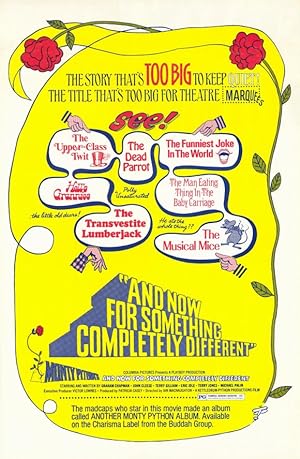
And Now for Something Completely Different Page #4
- PG
- Year:
- 1971
- 88 min
- 1,341 Views
I have in this box...
mice which I have
painstakingly trained...
over the past few years...
to squeak at a selected pitch.
This one is "A"-Sharp...
and this one is "G".
"G", "A"-Sharp.
You get the general idea.
Now, these mice are so arranged
upon this rack...
that when played
in the correct order...
they will squeak...
"Three Blinded White Mice."
Ladies and gentlemen,
I give you, on the mouse organ...
Thank you.
- Oh, my God!
- Somebody stop him.
Ten seconds, studio.
Stop him!
Stop that bastard!
Hello, and welcome to another
edition of It's the Arts.
And we kick off this evening
with a look at the cinema.
One of the most prolific film directors
of this age, or indeed, of any age...
is Sir Edward Ross, back in this country
for the first time in five years...
to open a season of his films
at the National Film Theatre.
And we are indeed fortunate to have him
with us in the studio this evening.
- Good evening.
- Edward...
- You don't mind if I call you Edward?
- Not at all.
It does seem to worry some people.
I'm not sure why.
Some are sensitive, so I do take the
precaution of asking on these occasions.
- No, that's fine.
- So Edward it is. Splendid.
- I'm sorry to have brought it up.
- No. Edward it is.
Thank you very much
for being so helpful.
- At times it's more than my job's worth.
- Quite.
Makes it hard to establish a rapport,
to put the other person at his ease.
- Quite.
- Quite.
Silly little point,
but it does seem to matter.
Still Iess said the better.
Ted, when you first went in the film...
You don't mind if I call you Ted,
as opposed to Edward?
- No. Everyone calls me Ted.
- Splendid.
- Because it's much shorter, isn't it?
- Yes, it is.
- Much Iess formal.
- Ted, Edward, anything.
Splendid.
Incidentally, do call me Tom.
I don't want you bothering with
any of this "Thomas" nonsense.
Fine. Where were we?
Eddie baby, when you first...
I'm sorry. I don't like
- I beg your pardon?
- I don't like being called Eddie baby.
Now get on with your interview.
- Did I call you Eddie baby?
- Yes, you did.
I don't think I did.
Did I call him Eddie baby?
Yes, you did!
I didn't call you Eddie baby,
did I, sweetie?
- Don't call me sweetie.
- Can I call you sugar plum?
- No!
- Pussycat?
- No!
- Angel drawers?
No, you may not.
- Now get on with it.
- Can I call you Frank?
- Why Frank?
- Frank's a nice name.
President Nixon's got
a hedgehog called Frank.
- What is going on?
- Frank. Frankie. Fran. Frannie.
- That's it. I'm leaving.
Had enough of this.
I've never been so insulted.
- Tell us about your film, Sir Edward.
- What?
Tell us about your latest film,
Sir Edward, if you'd be so kind.
- None of this pussycat nonsense?
- Promise.
Please. Sir Edward.
- My latest film?
- Yes, Sir Edward.
I first had the idea, funnily enough,
when I joined the industry in 1919.
Of course, in those days
I was only a tea boy...
Oh, shut up.
- There he is!
- Get him.
Stop him!
He's a murderer!
Come back, you fiend! Fiend!
He's a murderer!
"The room is full of milkmen...
some of whom are...
are very old."
This man is Ernest Scribbler...
manufacturer of jokes.
In a few moments he will think
of the funniest joke in the world...
and as a result
he will die laughing.
It was obvious
the joke was lethal.
No one could read it and live.
Scribbler's mother, alarmed by
the unusual sounds of merriment...
entered the room and found
what was, apparently...
a suicide note.
The war against the Hun
continues...
and as Britain's brave boys
battle against the Bosch...
their leaders are on the lookout for
new breakthroughs that could provide...
the ultimate weapon
in the war against the Hun.
Here, in this little house in Pinchley,
they think maybe they've found it.
It's a joke so deadly, it could have
Fritz's forces falling about.
Tests on Salisbury Plain confirm...
the joke's devastating effectiveness
at a range of up to 50 yards.
Fantastic!
All through the winter of '43...
we had translators working
in joke-proof conditions...
to try and manufacture
a German version of the joke.
They worked on one word each
for greater safety.
One of them saw two words by mistake and
had to spend several weeks in hospital.
But apart from that,
things went ahead pretty fast.
And by January
we had the joke in a form...
which our troops couldn't understand,
So on July the 8th, 1944...
the joke was first told
to the enemy...
in the Ardennes.
Squad, tell the joke!
In action, it was deadly.
The German casualties
were appalling.
It was a fantastic success
over 80,000 times as powerful...
as Britain's great prewar joke,
which was used at Munich...
and one which Hitler
couldn't match.
I would like to apologize
for the rather poor taste...
of the previous item.
And excuse me, please.
Fleet Street, please.
All right, everybody,
stay close.
Don't lag behind.
Keep together, everybody.
Remember. Watch out
for the killer cars.
Yes, the killer cars.
For years the city had been plagued by
ever-increasing pedestrian congestion.
In an attempt to eliminate
this problem...
certain fanatical cars,..
had taken the law
into their own hands.
But the days of the killer cars
were numbered...
thanks to the miracle
of atomic mutation.
Thank you!
You've saved our city!
But at what cost?
Just then as it looked for certain,
that the city was about to be eaten...
the earth trembled and the sun
was blotted out from the sky.
Suddenly, swarms of giant
bees filled the air...
and 300 million armored horsemen covered
with coats of 1,000 different colors...
appeared at every street corner
attacking the monster cat...
in a scene of such
spectacular proportions...
that it could never in your life be seen
in a low-budget film like this.
If you'd notice,
But just as the monster cat
was starting to weaken...
with a deafening roar and...
Hello. I wish
to register a complaint.
- Hello. Miss?
- What do you mean, "miss"?
Oh, I'm sorry. I have a cold.
I wish to make a complaint.
Sorry.
We're closing for lunch.
Nevermind that, my lad.
I wish to complain about this parrot...
what I purchased not half an hour ago
from this very boutique.
Oh, yes, the Norwegian blue.
What's wrong with it?
I'll tell you what's
wrong with it, my lad.
It's dead.
That's what's wrong with it.
No, it's resting. Look.
Look, my Iad, I know a dead parrot when
I see one and I'm looking at one now.
No, that's not dead,
it's resting.
- Resting?
- Yeah, resting.
Remarkable bird, the Norwegian blue,
isn't it? Beautiful plumage.
The plumage don't enter into it.
It's still dead.
No, it's resting.
All right, then.
If it's resting, I'll wake it up.
Hello, Polly!
I've got a nice, fresh cuttlefish for
you if you wake up, Mr. Polly Parrot!
Translation
Translate and read this script in other languages:
Select another language:
- - Select -
- 简体中文 (Chinese - Simplified)
- 繁體中文 (Chinese - Traditional)
- Español (Spanish)
- Esperanto (Esperanto)
- 日本語 (Japanese)
- Português (Portuguese)
- Deutsch (German)
- العربية (Arabic)
- Français (French)
- Русский (Russian)
- ಕನ್ನಡ (Kannada)
- 한국어 (Korean)
- עברית (Hebrew)
- Gaeilge (Irish)
- Українська (Ukrainian)
- اردو (Urdu)
- Magyar (Hungarian)
- मानक हिन्दी (Hindi)
- Indonesia (Indonesian)
- Italiano (Italian)
- தமிழ் (Tamil)
- Türkçe (Turkish)
- తెలుగు (Telugu)
- ภาษาไทย (Thai)
- Tiếng Việt (Vietnamese)
- Čeština (Czech)
- Polski (Polish)
- Bahasa Indonesia (Indonesian)
- Românește (Romanian)
- Nederlands (Dutch)
- Ελληνικά (Greek)
- Latinum (Latin)
- Svenska (Swedish)
- Dansk (Danish)
- Suomi (Finnish)
- فارسی (Persian)
- ייִדיש (Yiddish)
- հայերեն (Armenian)
- Norsk (Norwegian)
- English (English)
Citation
Use the citation below to add this screenplay to your bibliography:
Style:MLAChicagoAPA
"And Now for Something Completely Different" Scripts.com. STANDS4 LLC, 2025. Web. 22 Feb. 2025. <https://www.scripts.com/script/and_now_for_something_completely_different_2824>.







Discuss this script with the community:
Report Comment
We're doing our best to make sure our content is useful, accurate and safe.
If by any chance you spot an inappropriate comment while navigating through our website please use this form to let us know, and we'll take care of it shortly.
Attachment
You need to be logged in to favorite.
Log In